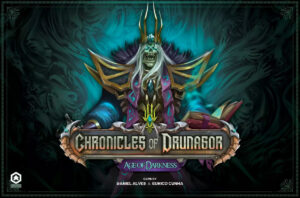 For someone that loves thematic games with loads of miniatures, it’s easy to think we’re in a golden age of plastic and narrative-heavy games. A lot of these games roar in on the hype train while they are on crowdfunding. On delivery, some go whimpering off to the discount bin while others are massive hits spawning reprints or further expansions. And a select few become instant classics of their genre. Good or bad, they mostly all share one ugly feature: the massive amount of space they take up on the table and on shelves. Chronicles of Drunagor: Age of Darkness was Tony’s number one game of 2021. Does it live up to the hype?
For someone that loves thematic games with loads of miniatures, it’s easy to think we’re in a golden age of plastic and narrative-heavy games. A lot of these games roar in on the hype train while they are on crowdfunding. On delivery, some go whimpering off to the discount bin while others are massive hits spawning reprints or further expansions. And a select few become instant classics of their genre. Good or bad, they mostly all share one ugly feature: the massive amount of space they take up on the table and on shelves. Chronicles of Drunagor: Age of Darkness was Tony’s number one game of 2021. Does it live up to the hype?
Gameplay Overview:
There’s a lot that’s familiar with how Chronicles of Drunagor plays when compared to other dungeon crawlers so I’m going to gloss over a lot of what’s the same to focus on the more unique aspects of the gameplay.
The initiative track sets the turn order for heroes and enemies as well as provides a location to store rune tokens (to be explained later). That rune word at the end of the track doesn’t look too ominous.
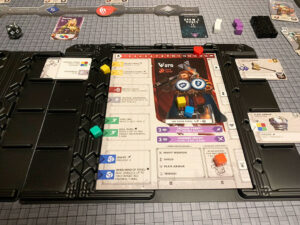
On each character’s turn, they can move up to three spaces and use two action cubes (often listed as AC which the old D&D player in me keeps reading as armor class). These action cubes are in four colors representing melee attacks (yellow), ranged attacks (red), agility (green), and wisdom (blue) skills that may also provide Shields, focus tokens, remove curse cubes, or grant more movement. Action Cubes can also be spent to move an additional three spaces as one of your two cube activations. Players can also save up focus tokens for other special abilities and some classes also have special abilities that grant extra attacks/actions.
When a player runs out of action cubes they can take a recall action which restores all your action cubes but also gives you one or more curse cubes that will block one ability until a cleanse action is used to remove one. An unwilling recall doesn’t end your turn but opting to recall when you still have action cubes to spend does.
Player ranged and melee attacks roll a d20 to hit with target numbers of seven or eight to inflict damage. Many weapons add a bonus for rolls of 16+. Critical hits are on rolls of 20 and double the damage of the attack, including bonus damage. Magic attacks always hit but can’t crit.
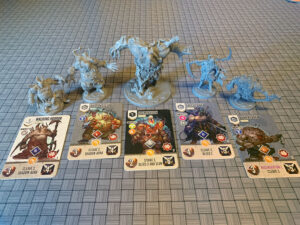
Enemies activate following a basic AI system of target whoever has the most health as a primary target. Some enemies get multiple attacks or can hit multiple targets with abilities like cleave or multishot and will prioritize hitting the group with the strongest hero and whoever else is with them. Additionally, enemy attacks always hit although players can spend one action cube as a reaction to defend themselves. Then, if an enemy attack gets through a player’s shield tokens and reaction actions any secondary effects like poison or burning take effect. If the character blocks all the damage, this secondary effect is ignored. If a character runs out of health, they gain a trauma cube that covers one ability slot much like a curse cube except that it’s harder to remove.
Darkness (which you can’t attack) is a plague that’s spreading through this world and is often spawning from specific enemies, enemy abilities, or spots on the map tiles. Typically at the rune step of the initiative track, one or more tiles are drawn from the rune bag and a tile of the shape on the token is placed on the board touching either a spawn point or adjacent to another darkness tile. Darkness hurts the players (take 2 damage for the first time stepping in it on a turn), gives a -2 penalty to hit enemies, and monsters do +1 damage, so it’s bad, mkay. The rune token is placed on the matching symbol of the initiative track. Depending on the scenario this could have an effect later but, as a hint, it’s probably also bad.
Scenarios last until the heroes win (and, optionally, strike a Captain Morgan pose) or a hero gains two trauma cubes or five curse cubes in which case you lose.
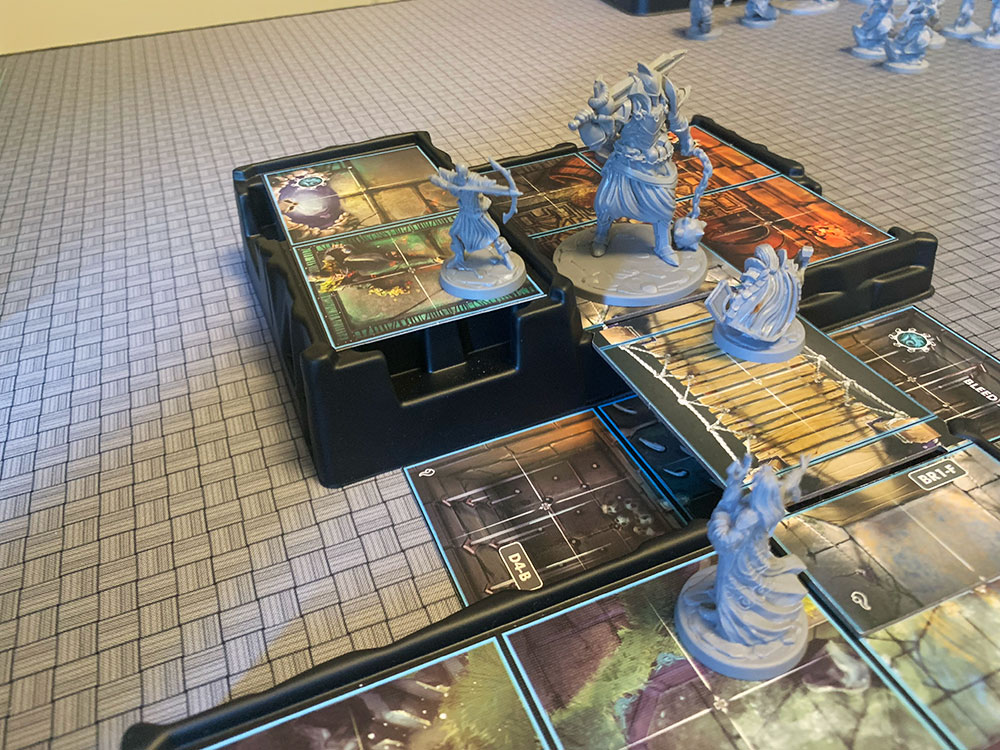
Gameplay Experience:
I like dungeon crawlers a lot but game length and game overhead are things that are starting to separate games I keep and games I move on from. A scenario in Chronicles of Drunagor probably averages about 30 to 45 minutes per character and seemed to be very balanced between the two and three-player games I played.
The action cube system is fantastic *chef kiss* and forces the players to make tough decisions and think about future turns as well as defend from attacks that you can see coming. Some abilities allow any color cube to be used forcing you to choose which action you can’t do until you cleanse or take a recall. And then there are the strategic combat choices or do you focus on the darkness spawning creature or the thing that is going to completely wallop the dwarf before they can take a recall action and defend themselves?
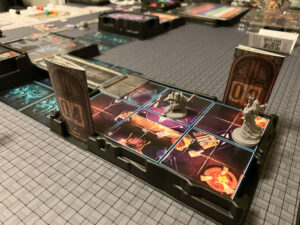
The system made me feel like I got to do something epic on most of my turns. Attacks might allow you to move and then do minor damage to some adjacent opponents, gain shields, or attack multiple opponents in a single attack. There were exceptions like where I healed, removed curse cubes, or had already used all my best abilities. But here’s where the system gets—you can decide that you want to end your turn early to take a willing recall and boom you have your epic abilities back (along with a curse cube for your troubles). The balance between slowing down to remove curse cubes and trying to stay ahead of the darkness is fantastic.
Before I go all Vince McMahon on this game I do have some minor gripes. The first is the game sprawls all over the table but the nature of the way the dungeon is slowly revealed over time, you sometimes have to adjust the map on the table to make space for the new rooms.
The treasure deck is, as far as I’ve seen it, mostly single-use potions and scrolls. More significant items are discovered through the game either as unique artifacts or as tiered item cards you unlock as you complete scenarios. If you already have two items, the reward often isn’t worth the risk on the trap die (66% to have something minor negative effect). The upside of this, and this includes how leveling is handled too, is the game is very well balanced. Chronicles of Drunagor forgoes tracking both money and XP in favor of prescriptive leveling and gear availability.
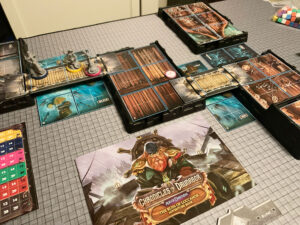
The biggest negative that I had with the game is that the narrative is generic with some awkward phrasing and occasional mistakes. Peering deeper into the theme several of the base game and Spoils of War monsters have a corrupted and bloated wizard-created abomination appearance (although mechanically they do have different attacks and immunities). Flipping that negative around, with many monsters being a random draw of either white, gray, or black enemy cards players can add in and remove monster types from the add ons that thematically fit each specific adventure as desired. This adds to the incentive to add extra monsters through the add ons as a way of boosting replay value despite the linear nature of the campaign.
Wrapping up on a positive, besides the variety that more monsters and heroes provide, the game has two more replay boosters. The first are the doors which show one room set up and have a QR code to scan to get a different layout. The second feature is the interactions which are pictures with paragraph numbers where you have to pick one or two of several choices. Each choice leads to some story vignette and often some other effect. You may get treasure, ambushed, a keyword, a boon, or a curse.
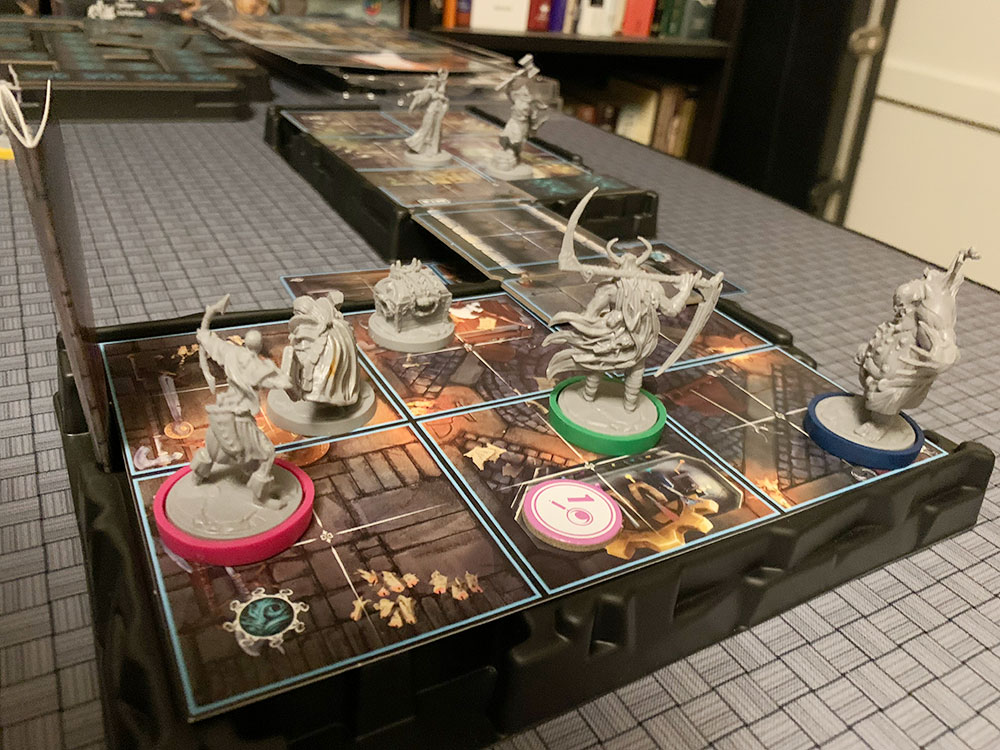
Final Thoughts:
Where does Chronicles of Drunagor end up for me? I’m going full Vince McMahon. I’m backing the expansion and adding some more Age of Darkness content. Within a few games, Chronicles of Drunagor has become one of my favorite dungeon crawlers due to the combination of the Action Cube system and the reasonable game length. While not as streamlined as games like Assassin’s Creed: Brotherhood of Venice or Cthlulhu Death May Die it’s juggling a lot more abilities, statuses, and equipment which threads that needle of having the right amount of depth of gameplay without becoming too cumbersome or fiddly.
Final Score: 4.5 Stars – Chronicles of Drunagor has you battling back the forces of darkness with an excellent action selection system that has you feeling like a powerhouse hero on almost every turn.
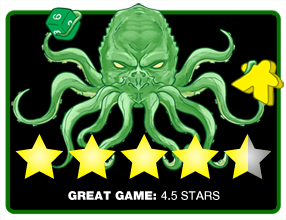 Hits:
Hits:
• Action Selection System is fantastic
• Characters get to do awesome things on most turns
• Well balanced with predetermined leveling and gearing up
Misses:
• Narrative isn’t award-winning prose and is sometimes generic
• Several monsters share a twisted and bloated appearance
• Sprawls all over your table and (with expansions) is a shelf hog




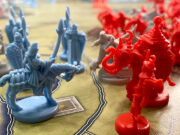
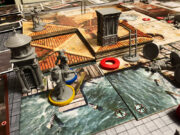
















James, you did a great job with the photos on this article, in terms of highlighting the 3D aspects of the game board.
Question: Has any game impressed you so much in terms of replayability and fun that you invested the time to paint the miniatures?
Thank you! I have painted a few games. Some of the ones I have painted are Cthulhu Death May Die, Batman GCC, Trick Shot and Marvel United. As I find myself with less and less time I do try to prioritize those games that will stick around for a long time. And fun games with a manageable number of miniatures tend to be projects I’d tackle over other games. But if time and shelf space weren’t an issue, I’d be painting a lot more games.
Narrative dungeon crawlers can be a tougher sell as you sort of know the story already. Will it get a second or third play though? I’m considering painting CoD as I think the mechanics are the draw to the game and should keep subsequent plays exciting.
Those games not only have replayability, they’re also dripping with theme. I can see why you love them.